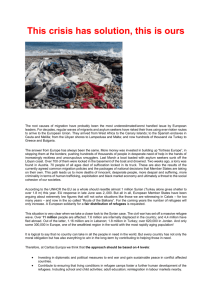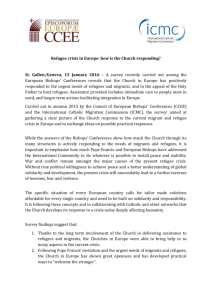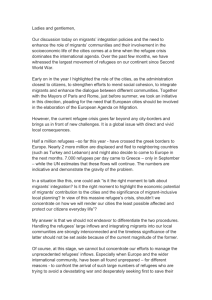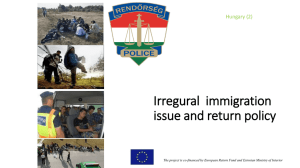Medical care for children of refugees and asylum seekers
advertisement
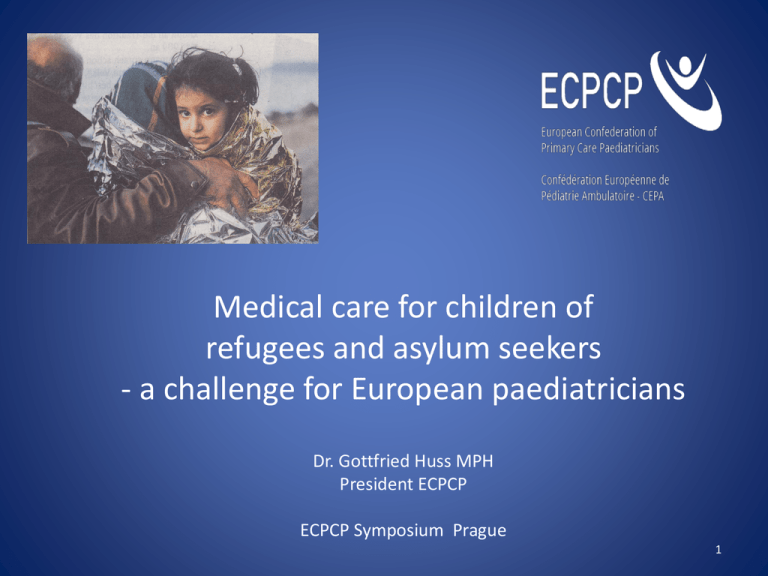
Medical care for children of refugees and asylum seekers - a challenge for European paediatricians Dr. Gottfried Huss MPH President ECPCP ECPCP Symposium Prague 1 Overwhelming migrationare we prepared ? • 2014: In Germany 15,7 Mio live with foreign nationality ( 80,6 Mio total population ) One out of five of the population and one out of three children have a migrational background • Since January 2015: 577.307 registered refugees in Germany – estimate of non registered 100.000 every day 8.000- 10.000 more arrive in Munich 2 Childrens human rights translated for migrants ´ Protection-> Weeks Provision-> Months Participation Years 3 Manifold barriers to implementation of human rights for refugees • Frontiers, barbed wire, police, violence • Limited… – access to housing, heating, schools, “kindergarden” – access to social services and to health services – access to preventive services- well baby checks – access to services for chronic illness, rehabilitation, psychological services 4 Health Syrian refugees in Munich 2015result of health screening • • • • 80% had respiratory viral infections 40% had some mental disturbance 10% had skin infections 40% had incomplete vaccinations if the could show a document 5 A closer look to health serices for migrants in Germany • Unacceptable delay of diagnosis and treatment • 2006: While 40% have been examined within the first 4 weeks of stay- 20% have not been examined within the first 6 month of stay • This shows the clear lack of medical services for migrants • Scientific evidence: Rising costs if access to health care is restricted Lit : Public Health institute Heidelberg and Bielefeld, Ratzum et al … 6 Routine TB screening after arrival Background: Fresh TB infections in 35% affect children born outside Germany ( Switzerland 44% ) German infection law demands tests for every refugee • < 15 years TB screening with tuberculin skin testing or interferon gamma release test • > 15 years X- ray • Problem: it is well known but we are just starting to implement it for all 7 Danger from Infections? • Refugees are not a source of infections - they are not dangerous • They are in danger of acquiring infections on their route of escape and in crowded compounds • Early recognition- complete examsanticipatory guidance- hygiene- vaccination • If not vaccinated the danger of epidemics in camps rises 8 Vaccination • The national schedule is the standard- but which are the most important ones? • Priorities are Measles, Varicella, Influenza, Meningitis C, Whooping cough, Hepatitis A Apply catch up vaccination as soon as possible • Prevent epidemics in camps Measles and varicella outbreaks happen frequently immediate mass vaccination in the incubation period can stop the outbreak and increase the herd immunity 9 10 Mental and emotional health 1 • Frequently traumatized from atrocities, violence and abuse • Data from Hamburg H. Adam – 50% were present in bombing – 40% witnessed destruction of their home – 18% of refugees children have PTSD – 10% feel responsible for the death of another person 11 Mental and emotional health 2 • Many orphans, unaccompanied minors • Sleep problems and behavioral disturbances, depression, lethargy, panic attacks • Protection from further traumas – for example horror movies or conflicts • At the moment we are very far away from adequate psychological treatment • Think about ways to cope and how to implement resilience building skills in groups with theater, role play, singing…. 12 Unaccompanied migrant children • Often cannot documents their age - the pressure for age assessment from authorities leads to useless X- rays, computed tomography and inspection of private parts without informed consent. This is unethical. • They benefit from early medical care, housing, foster care, families who care, early language courses. 13 Where is medical care offered? Can we cope? Step 1 • Large compounds for 500– 2000 refugees in big cities as temporary place to stay for days or weeks – tents, big halls • Role of Red Cross, NGOs and other voluntary professionals • Many are waiting up to 2 weeks to registration 14 Where is medical care offered? Can we cope? Step 1 • Big compounds after arrvial • Hundreds of voluntary physicians and NGOs offer medical care wherever without salary • TRIAGE - Rapid health screening in health posts with paramedics and physicians • Simple treatments with donated drugs • TB- screening? Vaccinations? 15 Where is medical care offered? Step 2 settle in small settlements Small decentral compounds in the region- housing for 200- 500 refugees - place to stay for month and weeks Some health initiatives - at the moment no health services in all compounds- open issue 16 Step 3 Medical care in paediatric offices Advantage: • Integration in comprehensive child care and routine preventive procedures • Financial mechanisms more or less clear- they need insurance cards with all privileges Disadvantage: • Difficulties to find the way and bring a interpreter • Rights and duties - get used to regular appointments 17 Help for self help • Basic health courses in compounds • First aid for children, nutrition, dental hygiene, vaccination, PTSD, how to handle the German health system 18 Do we have to change? Are we prepared? • Nurses and doctors- we should improve our trans- cultural competences- our attitudes and our knowledge- our communication skills – Why does this lady not shake hands? – Why does this boy not permit to examine his genitals? • Our society is changing- we will live every day more in a multi- ethnical and multi- cultural society – this is enrichment! 19 What can primary care paediatricians do? • Paediatric associations should be advocates for migrant children and give recommendations • Support the health of migrants • Equitable access to medical care (including preventive care, chronic care, mental health and social paediatrics) • Migrants at all age should undergo early vaccinations and complete medical exam by a paediatrician as soon as possible within the first weeks • Not only professional help is needed. Refugees need our empathy, spontaneous support and civic couragegive time, give closeness, give joy! 20 21


